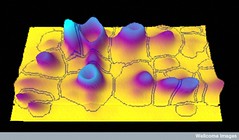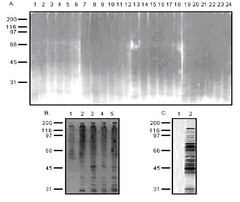There are many ways of finding biomedical images on the web for exhibition use, and some are better the others.
Getty Images, which is otherwise a fantastic online repository of professional high-quality images, is practically useless for a small museum like ours. Search ‘protein’, for example, and you get over a thousand images of eggs, tofu and pork meat and other everyday stuff associated with proteins, but very few scientific images — and the few they have are excruciatingly expensive (the cost for using a single ‘beautiful’ electrophoresis image is around 600 USD). I dare not reproduce even a thumbnail size image from Getty Images here because we risk being persued for violating their intellectual property rights; in fact, I’m not even allowed to show their company logo!).
 Wellcome Images is much more useful for our exhibition purposes. Search ‘protein’ and you get over 500 images of protein molecule models, fancy microscopic images, high-tech protein research instruments, and so forth — like this image of a computer-enhanced analysis of a 2D protein gel (credit: Nicoletta Baloyianni; Wellcome Images). They’ve also got some good images of protein-rich food items and other everyday stuff. And best of all for a poor university museum like ours — their images are freely available for download under a Creative Commons licence.
Wellcome Images is much more useful for our exhibition purposes. Search ‘protein’ and you get over 500 images of protein molecule models, fancy microscopic images, high-tech protein research instruments, and so forth — like this image of a computer-enhanced analysis of a 2D protein gel (credit: Nicoletta Baloyianni; Wellcome Images). They’ve also got some good images of protein-rich food items and other everyday stuff. And best of all for a poor university museum like ours — their images are freely available for download under a Creative Commons licence.
Both Getty Images and Wellcome Images are collections of ‘beautiful images’ — that is, the kind of immediately aesthetically pleasing pics that science magazines fill their pages with and scientists like to hang on their office doors. The Yale Image Finder search engine developed by Michael Krauthammer’s lab at Yale Center for Medical Informatics is different (read more about the project here).  It allows you to find the image content of (presently) some 35,000 open access articles from PubMed Central by key word searches in figure texts, captions, abstracts, titles and even full article texts. For example, searching for ‘protein’ in captions and figure texts gave 19,000 hits, like the Western blog analysis image to the right.
It allows you to find the image content of (presently) some 35,000 open access articles from PubMed Central by key word searches in figure texts, captions, abstracts, titles and even full article texts. For example, searching for ‘protein’ in captions and figure texts gave 19,000 hits, like the Western blog analysis image to the right.
Yale Image Finder is developed as a tool for scientists, not for curators. Right now it’s somewhat bothersome to use, because you have to sift through so much material. But it gives you rapid access to hundreds of thousands of close-to-the bench kind of images which do not find their way to Wellcome Images, and as such it may become a useful supplement to the ‘beautiful image’ online repositories.
